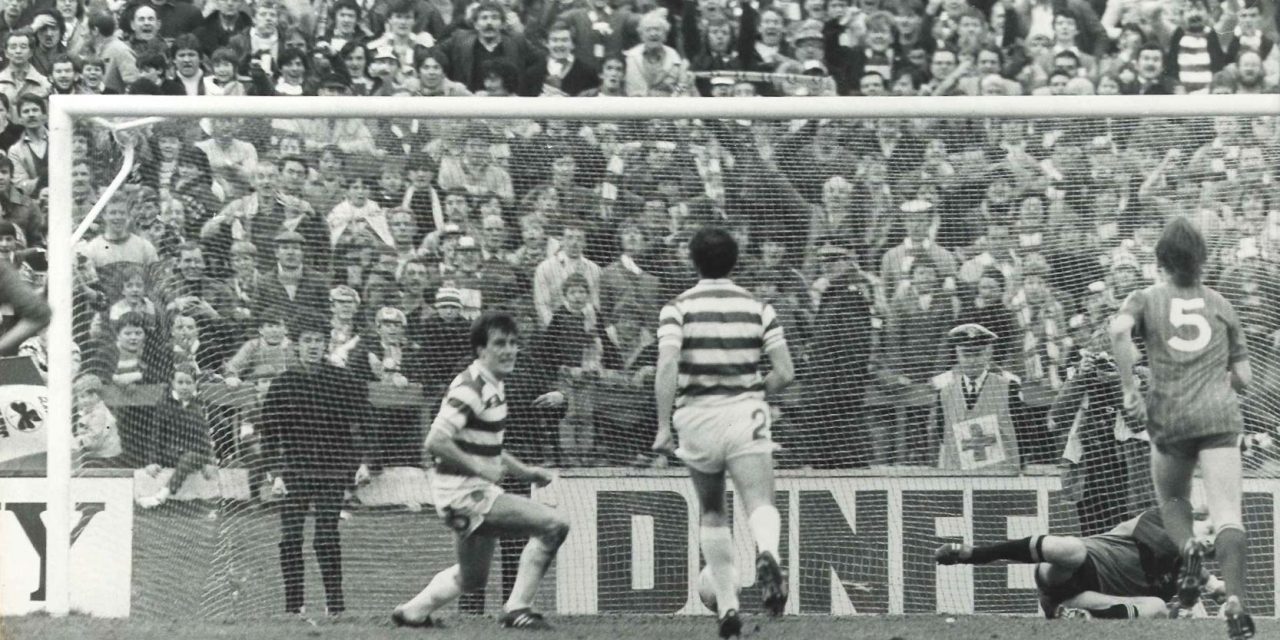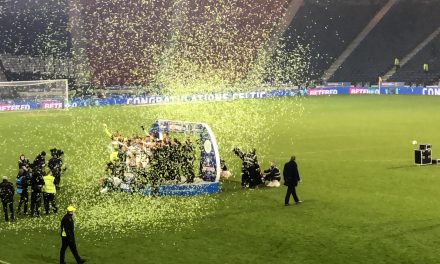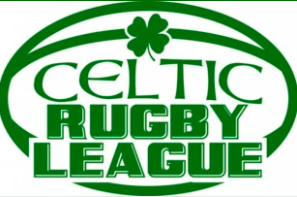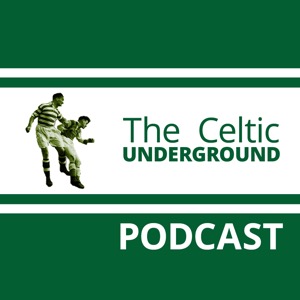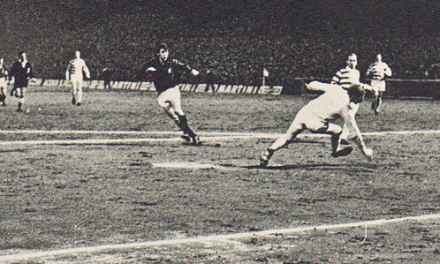St Anthony continues with his personal recollections of Celtic games he has attended through the years. In this article he recalls an Aberdeen side at their peak of their powers under Alex Ferguson, an unlikely Celtic semi-final hero and the dark shadow of football hooliganism.
Setting the scene
In 1984 Aberdeen were at the peak of their powers under Alex Ferguson. They had an array of talented players such as Willie Miller, Alex McLeish, Gordon Strachan, Mark McGhee and Eric Black who were amongst the best not only in the UK but in European football. The previous season they had won the European Cup Winners Cup by beating Bayern Munich and Real Madrid and in the current term they had already won the European Super Cup by beating SV Hamburg over two legs. This was impressive form by anyone’s standards.
On the day of this game the Dons were looking forward to their ECWC quarter final tie with Ujpest Dosza from Hungary and were sitting on top of the SPL courtesy of a massive six point lead with a game in hand, thus ensuring that they travelled to Glasgow for this League Cup semi-final second leg in good spirits. The first leg had ended 0-0 at Pittodrie 17 days previously in a game which Celtic should have won but had failed to do so due to fine goalkeeping from Leighton and poor finishing, so the tie hung very much in the balance.
Celtic, for their part, were enjoying an inconsistent season. They had reached heights against Sporting Lisbon in the UEFA cup and beaten Rangers home and away yet they had failed to beat lower division opposition such as Brechin City and Kilmarnock at Celtic Park. This inconsistent form had hugely frustrated their fans who were still reeling over the departure of star strikers, Charlie Nicholas and George McCluskey, the previous summer. In this campaign so far, Celtic had never really reached their form of previous seasons.
This was now a golden opportunity for the Celts to reach a major final with home advantage but to put things in context Aberdeen had an incredible record at Celtic Park and they had won 9 of the previous 12 Parkhead fixtures over a 5 year spell dating back to March 1979. Despite Celtic’s home advantage, Aberdeen were clear favourites to win and came to Glasgow full of confidence that they would be able to extend their magnificent record in Glasgow’s east end.
The game
Aberdeen were struck a series of blows before the game. Peter Weir was declared unfit and with Mark McGhee suspended and Stuart McKimmie cup tied this was too severely weaken the Dons’ line up. Celtic manager Davie Hay named Davie Provan on the bench as the winger was not yet fully recovered from a hamstring injury. A crowd of 41,000 packed into Celtic Park on one of those days when it was hard to imagine where an extra 26,000 would stand to bring the ground up to its full 67,000 capacity.
Celtic manager, Davie Hay, decided to position Graeme Sinclair alongside Tom McAdam in defence to allow Roy Aitken to be deployed in midfield. He anticipated a physical battle and he was not to be disappointed. In only 3 minutes Aberdeen’s aggressive midfield man, Neale Cooper, was booked for a foul in Tommy Burns and this was after he had committed a previous assault on Frank McGarvey only seconds into the game.
Both sides made their intent clear and the first half was disappointing for the crowd as the match developed into a war of attrition. Aitken and Murdo MacLeod had nullified the physical strength of Cooper and Neil Simpson in the Aberdeen midfield but the ball players such as Gordon Strachan, Tommy Burns, Paul McStay and Dougie Bell could find no time or space on the field to show their skills.
Hay made a vital change at half time with the game locked at 0-0. Davie Provan came on for Sinclair to allow Aitken to move back into defence. This gave Celtic better balance and a threat in a wide area which they had lacked until now. In 54 minutes Provan played a ball into the area to Tommy Burns, who had his back to goal. As Burns turned quickly, Dougie Bell impeded him and sent him crashing to the ground with the referee, Bob Valentine, immediately pointing to the spot. Celtic left back Mark Reid was entrusted with taking the vital spot kick and he was required to wait some time to take it until the protest of the Aberdeen players had died down. Many fans in the stadium couldn’t watched and Reid took a slow build up before powering a firm shot past Jim Leighton. Reid had shown great nerve and commendable composure in scoring in such a high pressurised situation to give Celtic a vital lead.
Parkhead exploded with joy although there was still more than half an hour remaining. Aberdeen now pushed forward with purpose which made it a more open game and this actually resulted in Celtic’s best spell with McGarvey going close with a chip over the bar and Brian McClair shooting weakly at Leighton. With time running out, Aberdeen made a last attempt on the Celtic goal and created their best chance of the game. Strachan and Bell combined on the right and Bell’s cross was headed down by Black to Hewitt and Celtic ‘keeper, Pat Bonner, made a superb point blank save from Hewitt’s volley. Celtic then managed to see out the final few seconds to prevail by 1-0 and earn a place against Rangers in the final.
Aftermath
The one sad element of the game had been the display of football hooliganism on show, particularly in the first half. With no method of segregation within the stadium at that time, Police had erected temporary barriers and a no man’s land between rival fans in the Rangers end of the ground. This hadn’t stopped fans from both sides launching missiles at each other and attempting to break through the Police cordons. 56 arrests were made inside Parkhead and many innocent fans had been injured by a hail of objects thrown from either side. In the summer of 1984 Celtic erected secure fencing inside Celtic Park in an attempt to prevent such scenes happening again. From then on segregation would be strict inside Celtic Park and the days of fans mixing on the terraces were over.
As it was, Celtic went on to narrowly lose to Rangers in a frustrating final, just a matter of weeks later. Aberdeen’s fared far better. They reached the semi-finals of the ECWC and were denied another glamour European final, this time against Juventus, by FC Porto. They had the consolation of winning the league by some distance and also lifting the Scottish Cup. So on this day, Mark Reid’s penalty kick had arguably denied Aberdeen the chance of winning the only domestic treble in their history.

